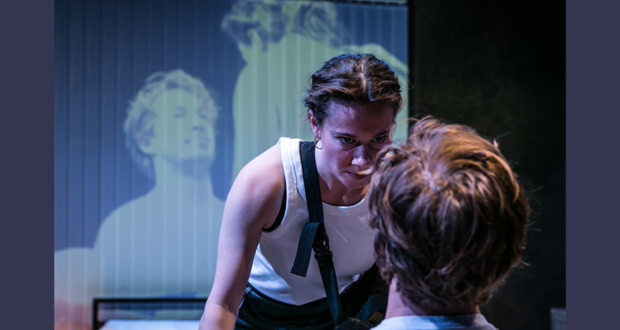A gripping, thought-provoking play that will leave you questioning everything you think you know about justice and revenge. With exceptional writing and high drama, it explores the court of public opinion. Summary
Rating
Excellent
Compared to its powerful conclusion, Robert Boulton’s Snowflakes has a mild opening: the audience see a hungover, semi-dressed man lying in a hotel bed fumbling around for paracetamol. Rapidly, the situation transforms into organised chaos as Marcus (also played by Boulton) and Sarah (Louise Hoare) burst in and apprehend him.
Throughout its two hour running time, the play debates countless questions surrounding cancel culture but fails to resolve any. The plot revolves around an organisation that provides its members opportunities to enact justice on their own terms. The accused is given a chance to present their defence, but ultimately their fate rests in the hands of viewers who will vote for their guilt or innocence through a live video feed. Tony (Henry Davis), a “left-leaning, alt-right troll” and author, is on trial.
To begin with, Tony’s alleged crime is not revealed, nor is the purpose of the organisation that Marcus and Sarah work for. This draws the audience in, successfully keeping them hooked and eager to unravel the mystery. Yet, we soon learn about the horrors of the “emerging industry”; how it provides people with closure, regardless of whether the perpetrators are actually guilty or not. Sarah chillingly says to Tony, “You’re just a job,” with no sense of regret for the type of work the group does.
Boulton’s writing abounds with lyrical lines and intricate metaphors, and the language is congruous with the characters: Tony is didactic, Marcus is exuberant and Sarah is detached. With the action set in an imagined post #MeToo era, where trials without evidence are common and have brutal repercussions, the actors’ portrayals of such intense emotions throughout are impressive, because their performances must be mentally straining. The comedic levity provides much needed relief, and one of the funniest moments is when Sarah introduces herself to the audience watching the livestreamed trial. Great emphasis is placed on the fact that it is her first day on the job and the beleaguered Tony begrudgingly mumbles her a ‘congratulations’. The casualness of Marcus eating a packet of crisps whilst Tony hysterically pleads for his life is equally amusing due to the complete absurdity of the situation.
Alys Whitehead’s design work is impeccable. The play is set in a hotel room with a bed in the centre of the stage and an uncomfortable-looking chair opposite. Sarah and Marcus sit across from each other, engaging in a discussion about feminism, adopting a quasi-Freudian stance. The back wall functions as both a window exhibiting London’s skyline and a projection screen: when the blinds are closed, the livestreamed video is projected onto it. This allows the audience to view the actor’s faces up close, which is useful to see their mastery of emotions.
The title of the play is taken from Tony’s novel Snowflakes, in which he discusses his reclamation of the word, through a long and intense monologue. He believes that frustration, anger, and blame are responsible for the problems in modern day society. This dystopian world has, however, been seen before. The television series Black Mirror is known to discuss these types of topics, so it feels a little overdone.
The Eagles’ Hotel California is heard at the conclusion, and one particular line literally reflects the plot: “you can check out but you can never leave”. It also echoes the sentiments of the play: in this world you cannot leave behind your past, and forgiveness is not an option. Snowflakes is a haunting and unforgettable play that will leave you questioning the true meaning of justice and revenge long after the curtain has closed.
Written by: Robert Boulton
Directed by: Michael Cottrell
Designed by: Alys Whitehead
Videography by: Dan Light
Snowflakes plays at Park Theatre until 6 May. Further information and bookings can be found here.
 Everything Theatre Reviews, interviews and news for theatre lovers, London and beyond
Everything Theatre Reviews, interviews and news for theatre lovers, London and beyond



